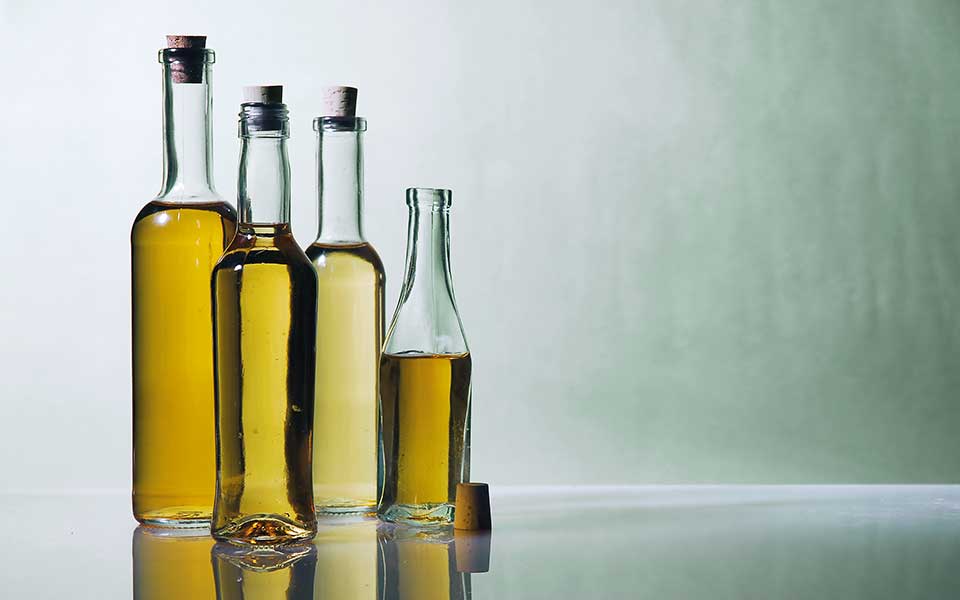Greek olive oil isn’t just one product; it’s a bounty of choices. Most of the olive oil produced in Greece comes from small family farms. As Ioanna Damianaki of Nature Blessed points out, “during olive tree cultivation, farmers use traditional methods combined with modern technology, generally producing a limited quantity. This way, they keep the quality of their olive oil very high and ensure sustainability.”
Moreover, Greece has several microclimates in which olive trees are cultivated, resulting in a diversity of unique aromas and flavors.
Other factors, such as the olive variety, harvesting time and procedure, as well as milling and storage methods, also affect the final product. While Koroneiki olives are used to make most of the country’s olive oil, producers also extract oil from many other types, including the large green Halkidiki olives of northeastern Greece, Olympia olives of the Peloponnese and Tsounati olives on Crete.
In Greece, around 80% of the olive oil produced is classified as extra virgin (the best and healthiest grade), the highest percentage in the world. In recent years, new extra virgin olive oil (EVOO) categories − early harvest and extra healthy high phenolic EVOOs − have been attracting increasing attention.

© George Tsafos
REVOLUTION
During a visit to Greece, Italian olive oil expert Saverio Pandolfi suggested that technological developments in the olive oil world had ushered in “a new era” that has enabled a “revolution in quality” in the last decade. University of Athens Professor Prokopios Magiatis points to another facet of this revolution, namely recent discoveries that highlight the impressive health benefits of EVOO.
Embracing improvements and innovations on both of these fronts, increasing numbers of Greek olive oil producers are aiming for the best possible flavor coupled with the highest nutritional value. As a result, many Greek olive oils that receive quality awards at international tasting competitions are also winning acclaim for their health benefits.
George Mathiopoulos says producers need to take good care of their fruit, “get it to the mill quickly, and control all the parameters of the milling process” to make the best, healthiest EVOOs. He and his family have devoted years to perfecting the process in their tiny village of Kato Rizospilia in Arcadia, in the Peloponnese, with impressive results. In 2016, their Drop of Life EVOO contained more healthy phenolic compounds than any other sample tested at the University of Athens. Last year, it also won gold and silver awards at international tasting competitions.
A number of Greek olive oil producers have been providing samples of their high phenolic olive oils for scientific studies. Eleni Zotou, for example, offers her Golden Tree EVOO to Harvard University’s Feeding America’s Bravest study, which is introducing American firefighters to the Mediterranean diet with the aim of lowering their risk for cardiovascular disease and cancer.

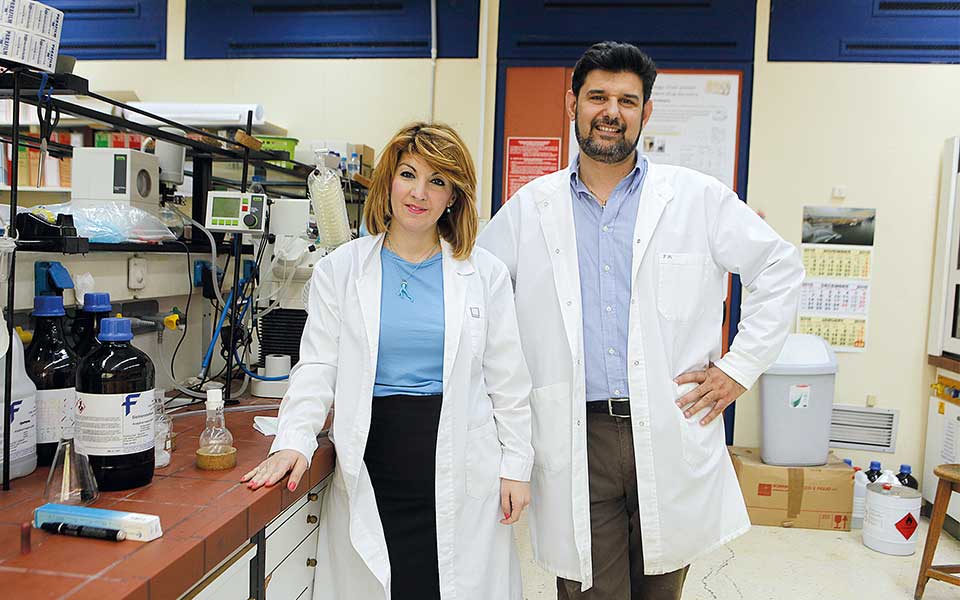
© Katerina Kampiti
INNOVATION
The olive oil revolution has inspired continuing innovation among Greek scientists, oil producers and entrepreneurs. Central protagonists in the Greek high phenolic olive oil story are Professor Magiatis, named Inventor of the Year for 2016 by the Hellenic Federation of Enterprises (SEV), Eleni Melliou (president of the World Olive Center for Health), and their award-winning research team at the University of Athens.
Together, they invented the Aristoleo® device, which allows producers to estimate the phenolic content (and health benefits) of their olive oil in the mill. They also introduced the Olive Predictor, a small, portable olive mill and tester, which enables olive farmers to estimate both the healthfulness and the amount of oil their fruit will produce before deciding when to start the harvest.
This team’s work inspired some olive oil producers to create EVOO capsules, and others to package EVOO in 200 ml bottles as nutritional supplements. The benefits associated with high phenolic olive oils are, according to Mathiopoulos, “at least as valuable as those of many supplements available to consumers, offering cardiovascular, neurodegenerative and cancer protection, as well as antioxidant and anti-inflammatory benefits.”
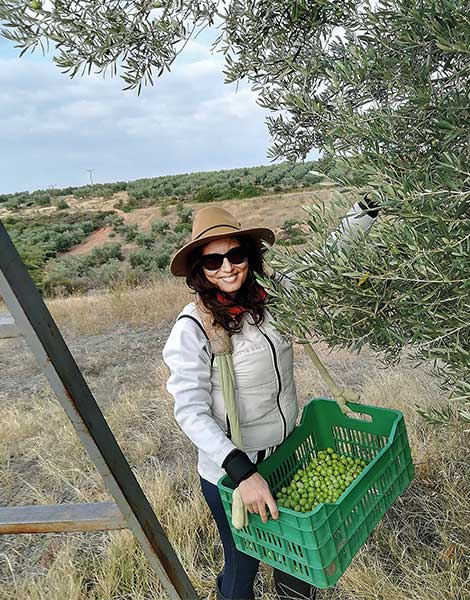
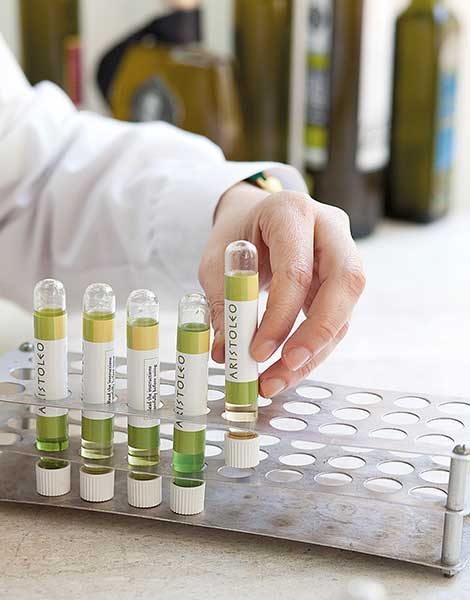
© Angelos Giotopoulos
HOW TO USE IT
Olive oil is, of course, most often simply eaten as part of a healthy diet, especially by Greeks, who consume more olive oil per person than any other nation in the world. They consume it raw, best preserving its flavor and nutrients, by dipping bread in it or pouring it over salads, eggs, fish, boiled or grilled vegetables, and many other dishes. (Diamantis Pierrakos of the olive oil company Laconiko suggests it be “drizzled on everything.”) A superior EVOO adds so much flavor that nothing else is required, but it can also be used in dressings, marinades and sauces. Extra virgin olive oil can even add a striking twist to chocolate mousse, ice cream, and cocktails!
Greeks also sauté, fry, stew and bake with olive oil. They cook meat, fish, and vegetables in it and add it to savory pies and casseroles as well as to cakes, cookies, soups and a category of stews called ladera (“oily”), with pulses, vegetables or meat swimming in olive oil. While some of the nutrients in extra virgin olive oil are most potent when it’s raw, scientific studies have demonstrated that it’s not only safe but beneficial to cook with olive oil. If you’re going to cook with a fat, many contend that olive oil is both the tastiest and healthiest choice.
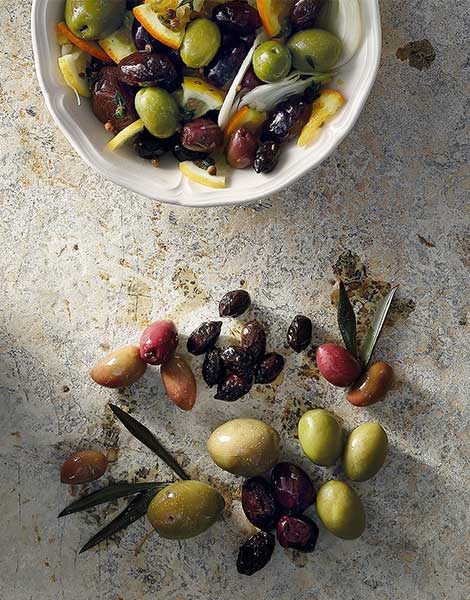
© George Drakopoulos
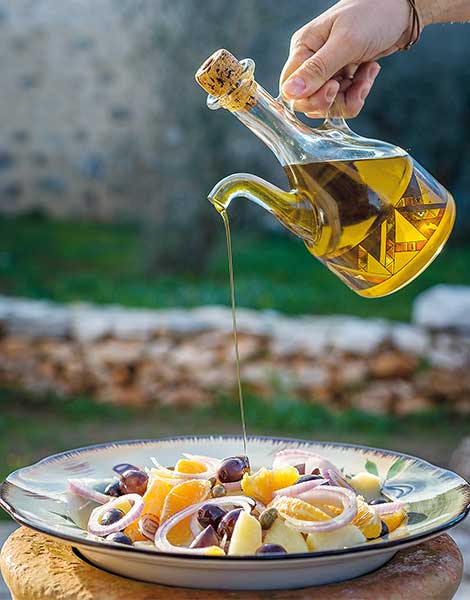
© Perikles Merakos
HOW TO TASTE it Like a pro
To taste olive oil, pour about 15ml into a glass. Cover the top with your hand, and enclose the bottom in your other hand to warm the oil slightly. Gently swirl the oil around in the glass, then inhale through the nose. What are the scents that come to mind? Are they fresh-cut grass, tomato leaf, or something else?
Next, take a sip. Swirl it around inside your mouth. Consider the flavors: apple, banana, almond or herbs? Is it more fruity than bitter, or is it a balance of both? An extra virgin olive oil will have some fruitiness, and a balance of fruitiness and bitterness is best.
Finally, swallow the oil, noticing the sensation: does its pungency make you cough? If so, that indicates the presence of the healthy phenolic compound oleocanthal. As George Mathiopoulos notes, “high phenolic olive oils have a bitter and spicy flavor, inspiring the phrase ‘Bitter is Better’ in the olive oil world!”
However, if you prefer a fruitier olive oil for certain uses, Greece offers those too, and all EVOOs are nutritious. Which one is best? It’s a matter of taste, so try several, and select your favorite.
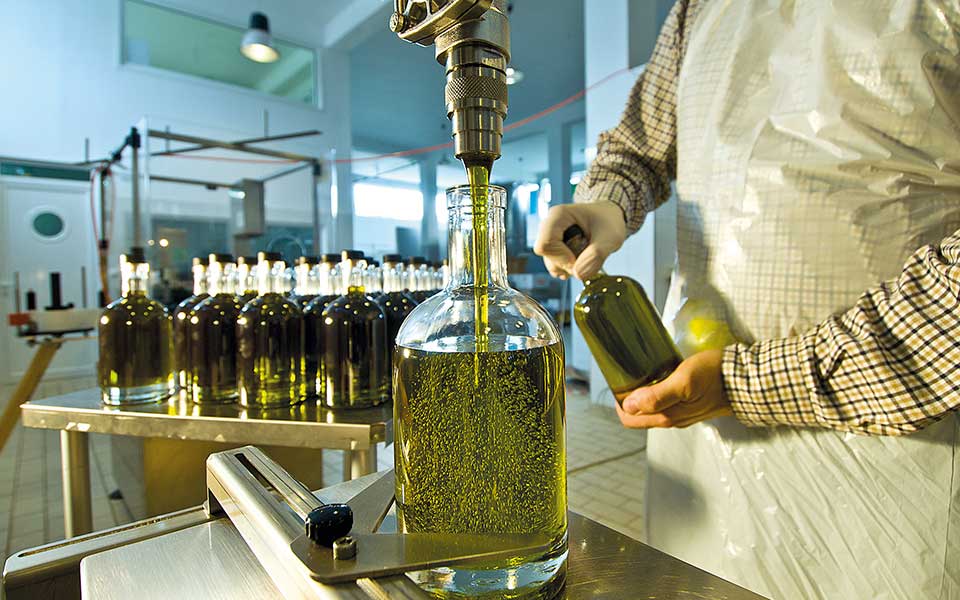
© Clairy Moustafellou
Why Extra Virgin Olive Oil is Both Food and Medicine
It contains polyphenols, which are antimicrobial, anti-inflammatory and antioxidant phytochemicals.
Antioxidants can help prevent illnesses such as chronic fatigue syndrome, fibromyalgia, diabetes, Alzheimer’s, Parkinson’s, atherosclerosis, and cancer.
Anti-inflammatory agents help fight off diseases associated with chronic inflammation, including cancer, heart disease, metabolic syndrome, diabetes, Alzheimer’s and arthritis.
Oleocanthal, a polyphenol found in extra virgin olive oil (EVOO), has anti-inflammatory effects similar to those of ibuprofen. Oleocanthal has killed cancer cells in test tubes, without harming healthy cells.
EVOO can make insulin work better, leading to lower blood levels of insulin and glucose and a lower risk of heart disease and some types of cancer.
EVOO helps lower the risk of high triglyceride levels, depression, osteoporosis, and high blood pressure.
EVOO can help in weight loss, since the fat in it leaves us satisfied enough to stop eating and keeps us feeling full longer.
Olive oil polyphenols are associated with “protection of blood lipids from oxidative stress,” meaning protection from heart attack and stroke, according to the European Food Safety Authority.
Using “olive oil daily may reduce the risk of coronary heart disease due to the monounsaturated fat in olive oil,” states a qualified health claim by the United States FDA.
Many health professionals and scientists recommend replacing other fats with 2-3 tablespoons of extra virgin olive oil daily, for its health benefits.

